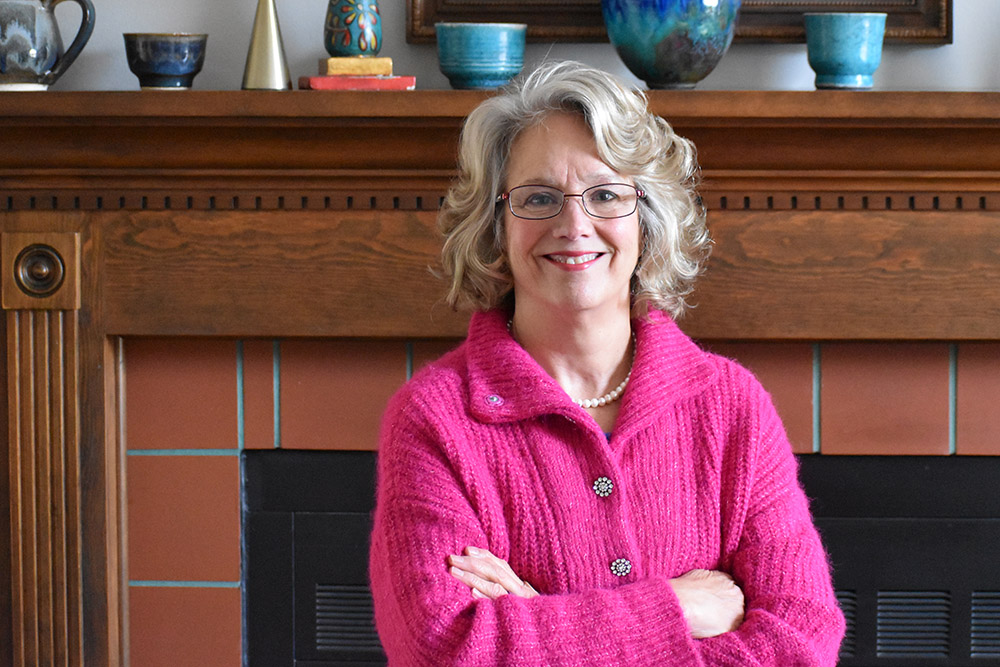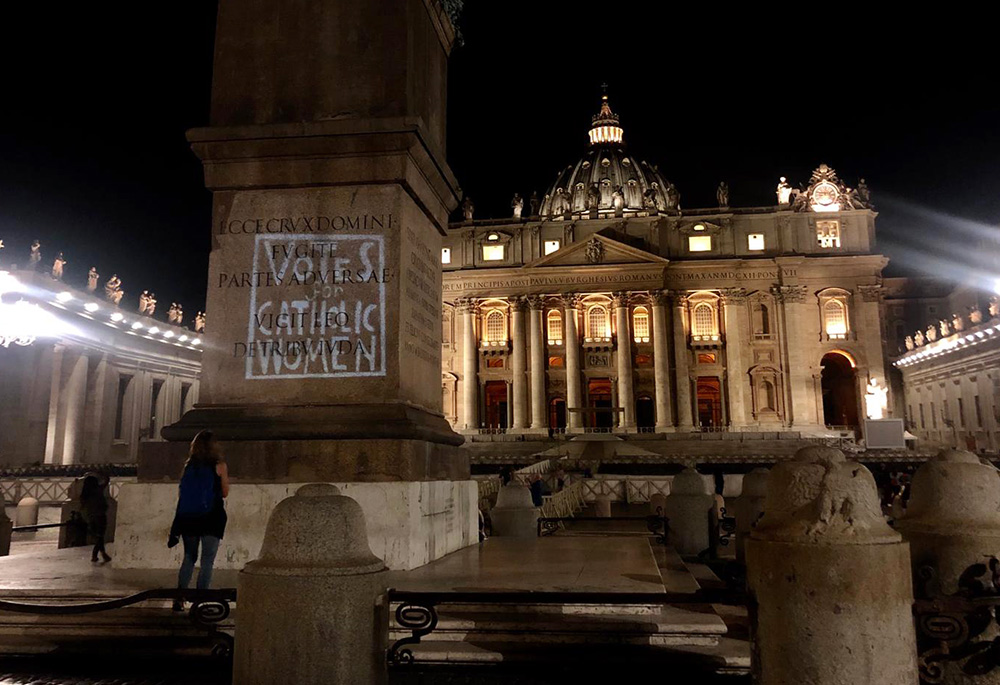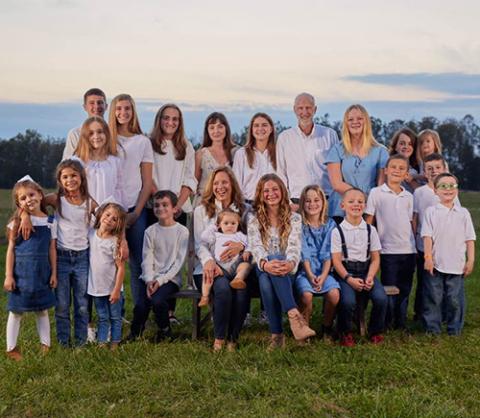
Deborah Rose-Milavec, co-director of the reform group FutureChurch and longtime advocate for marginalized communities, will retire at the end of the year. (Courtesy of Deborah Rose-Milavec)
On Oct. 3, 2018, as bishops and cardinals entered the Vatican to participate in the Synod of Bishops on young people, a group peacefully protested the fact that no women would be allowed to vote at the international gathering.
Standing outside the Palace of the Holy Office, near where the synod members would enter the city-state, several dozen women and men chanted: "Knock, knock." "Who's there?" "More than half the church."
Their actions drew the attention of the Italian police who patrol the area around St. Peter's Square. The police broke up the witness while demanding passports, yelling in one woman's face and grabbing the arm of another.
The stress of the confrontation, however, did not stop the women. Later that afternoon, Deborah Rose-Milavec, executive director of FutureChurch, an Ohio-based reform organization, and Kate McElwee, executive director of the Women's Ordination Conference, set to work crafting a petition for voting rights.
That petition would garner more than 10,000 signatures in two weeks, and the activism helped intensify a larger conversation about women voting in synods.
Rose-Milavec, 68, recently announced she will retire from FutureChurch at the end of this year. But before departing, she was able to celebrate that, for the first time in history, a group of 54 women cast votes in the October 2023 Synod of Bishops on synodality.
"It was a joy to see the church move forward in such an inclusive way," Rose-Milavec told NCR. "Of course, it's only the beginning, but it was a big step forward and something that we worked hard to accomplish."

During the 2019 synod for the Amazon, Deborah Rose-Milavec helped project images of a "Votes for Catholic Women" sign around Vatican City. This past fall, women voted in a Synod of Bishops for the first time. (Courtesy of Deborah Rose-Milavec)
Colleagues said the persistence, collaboration, creativity and passion Rose-Milavec brought to the "Votes for Catholic Women" campaign are qualities emblematic of her past decade at FutureChurch.
"Deb has made her mark as a leader, as someone who is always willing to help widen the table," said McElwee, who organized the 2018 protest. "She is a brilliant combination of spirit and spunk and a serious work ethic to advance the church."
FutureChurch was founded in 1990 by Fr. Louis Trivison, St. Joseph Sr. Christine Schenk and Catholics from 16 faith communities in the Cleveland Diocese. Members of the coalition were concerned about the shortage of priests and called for the ordination of women and married priests to ensure access to the Eucharist. (Schenk is now an NCR board member and columnist.)
The organization has grown over the years and includes educational and spiritual materials, podcasts, and events and advocacy around racial justice, clergy abuse, women's inclusion, and LGBTQ issues.
Loretto Sr. Jeannine Gramick is a relentless advocate for the LGBTQ community and a longtime supporter of FutureChurch. (In 1999, the Vatican prohibited her from continuing her work, but in recent years she has been supported — and befriended — by Pope Francis.)
When Schenk resigned as executive director in 2013, Gramick was a bit nervous, as the founder would be "a hard act to follow," Gramick told NCR.
But when she got to know Rose-Milavec through her international work with church reform groups, and justice and women's groups, "I felt FutureChurch was in very competent hands," Gramick said.
Advertisement
"I have nothing but the greatest admiration for Deb, for what she does and for who she is," said Gramick. "For people in need, for the LGBTQ community, she has always been there. And besides all her wonderful qualities, I would say she's someone really fun to be with and work with."
McElwee agreed. "Deb infuses joy into the struggle — joyful resistance along with that prophetic persistence."
Schenk, in a Dec. 1 FutureChurch press release about the retirement, said that, with Rose-Milavec, "God truly sent a successor I only dared to dream about."
"Her passionate energy, creativity and worldwide connections helped fuel FutureChurch's international expansion," Schenk said.
Russ Petrus joined Rose-Milavec in a co-directorship role in 2019 and will serve as sole executive director starting Jan. 1.
Under Rose-Milavec's leadership, FutureChurch helped advocate for greater participation in the synods, created online programming that spotlights biblical, historical and contemporary women, and founded the award-winning Catholic Women Preach project.
The project produces regular reflections on Scripture from women around the world and gives Catholics an opportunity "to hear women's wisdom, their challenges, the way they see faith," said Rose-Milavec, who holds a master's degree in theology and trained as a lay pastoral minister. "We are really impoverished as a church when we only hear one thin slice of voices preaching every week."
Catholic Women Preach, she said, allows listeners to "hear God's voice through the diversity of God's people."
'I know this work is tough and long and moves by inches instead of miles. You learn that you're not going to fix everything. You're not going to get everything you want all at once.'
—Deborah Rose-Milavec
McElwee said that among the many meaningful collaborations with Rose-Milavec was the "Nun Justice" campaign, a response by several reform groups to the Vatican's controversial investigations into U.S. women religious about 10 years ago.
"That was a great time to work with Deb and see her skills come to life," said McElwee. There is a lot of "hard work behind grassroots movements — the paperwork, filing petitions, getting people to talk about the issue, networking — and Deb has all those skills."
Rose-Milavec began her tenure at the Catholic nonprofit a few months after Francis was elected on March 13, 2013. She said his papacy has empowered the work of FutureChurch.
"The truth is, Pope Francis has let loose something that is not going to be turned back," said Rose-Milavec. "With Francis, it has been a brand-new era of being able to talk about issues frankly, with authenticity, with faith, with kindness and generosity."
Reform-focused institutions have felt emboldened "to speak freely, with courage, and to say what we see as necessary for the church," she said.
But she said at 68 years old, she's learned to manage her expectations about church reform.

Retiring at the end of 2023, Deborah Rose-Milavec plans to spend more time with her 21 grandchildren. (Courtesy of Deborah Rose-Milavec)
"I know this work is tough and long and moves by inches instead of miles," she said. "You learn that you're not going to fix everything. You're not going to get everything you want all at once.
"But I'm going to keep doing whatever I can do, as smartly and as coordinated as possible, working with other people, and I'm just going to be pushing for change — and celebrate when we actually get some."
And when there's a setback, "have a glass of wine and hug each other," she added with a laugh.
This October, as the synod was underway, Francis held a meeting with Gramick and three staff members from New Ways Ministry, a Maryland-based LGBTQ Catholic advocacy group she founded.
"When I met with Pope Francis, he said, 'Don't lose hope,' " Gramick recalled. "And to me, Deb is an example of what the pope is talking about."
Even with disappointments, there is hope "for the equality for women, for LGBTQ people, for the poor, for the oppressed," Gramick said. "Deb's faith in people, her faith in the church, I think keep her active and engaged. They keep her filled with hope."
In retirement, the mother of seven plans to leave ample time for lighthearted activities such as kickball games and roller skating — she has a pink pair — alongside her 21 grandchildren.
Yet Rose-Milavec said she also intends to maintain her activism around women in the church and become further involved with groups addressing gun violence, including Nuns Against Gun Violence.
"Before I die," she said, "I would be really happy to see children become safer, people on the streets become safer."
Rose-Milavec said she's confident FutureChurch is going to continue to thrive after her departure.
Petrus is "a phenomenal person with so many gifts," she said. "He'll engage in the work that we have done over the past 10 years and, as we have always done: Where we see a problem in the church — we work as hard as we can to address it."







